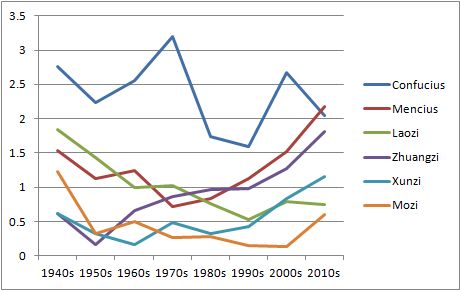Two more recent books, one on women and Confucianism in Choson Korea, the other on emotions in East Asia.
Monthly Archives: July 2012
CFP: ISCWP 2013 Beijing Roundtable
Bo Mou, the Beijing Roundtable series coordinator for the ISCWP, has issued the first CFP for the 2013 Beijing Roundtable — this year, to be held in Wuhan, China. More more information, see this link.
New Book: Daxue and Zhongyong: Bilingual Edition
I’ve just received a copy of the new Johnston and Wang translation of Daxue and Zhongyong from the Chinese University of Hong Kong Press (distributed in the US by Columbia University Press). Since there are quite a few translations of these texts around, and it doesn’t seem that one can get a Table of Contents or much information from the CUP or Amazon websites, I thought I’d share a bit about the volume here.
Journal of Religious Ethics Table of Contents 40.3
The latest issue of the Journal of Religious Ethics features several articles of interest. Continue reading →
Program for Conference on De-Parochializing Political Theory
What should be a fascinating conference on De-Parochializing Political Theory will be held next week at the University of Victoria in British Columbia. The lastest conference program is here; for more information, see the conference website. David Elstein and I are among the participants, so we’ll try to report back.
Poetic Metaphysics of the Dao De Jing
Another in a series of posts by guest blogger Joel Dietz, discussing the metaphysical doctrine of the Dao De Jing. Please address comments to him.
There is a natural relationship between metaphysics and “esoteric” subjects, insofar as metaphysics generally claims to discuss reality in a way that is not perceived by every human being, including often elusive topics such as “God/godhead” or various types of “essence.” It also has a natural relationship with aesthetics, insofar as metaphysical claims are frequently made as a part of artistic creation and evaluation. These frequently introduce a qualitative difference between different artistic works, as exhibited by the famous quip of Mahler, “There was only Beethoven and Richard [Wagner] – and after them, nobody.”
Daniel Bell on Meritocracy
Jiang Qing and Daniel Bell’s op-ed in the New York Times attracted a great deal of interest. Bell published another op-ed in the Christian Science Monitor a couple of days ago on the broader subject of meritocracy. This can illustrate how he differs from Jiang. I’m assuming he didn’t choose the headline (“What America’s flawed democracy could learn from China’s one-party rule”). The comments are also quite interesting.
Chinese Philosophy Arcs
[Guest contributor, Eric Schwitzgebel, takes a quantitative look at Anglophonic discussions of Chinese philosophy and offers a conjecture. Please address all comments directly to him.]
Different classical Chinese philosophers have drawn different amounts of discussion in the Anglophone world over the past seventy years. I want to look at this phenomenon quantitatively and then suggest a general conjecture about the history of philosophy.
The six target philosophers include two who are well-known in the Western world outside scholarly circles, Confucius and Laozi (aka Lao Tzu), and four who are much less well known, Mencius, Zhuangzi, Xunzi, and Mozi (aka Mengzi, Chuang Tzu, Hsün Tzu, and Mo Tzu). Below is a graph of their “discussion arcs” — that is, the rates, times 1000, at which their names appear in keyword (including abstract and title) searches in Philosopher’s Index, divided by a representative universe of articles. Click the image for a clearer view.
New book on contemporary Chinese political thought
Contemporary Chinese Political Thought: Debates and Perspectives, edited by Fred Dallmayr and Zhao Tingyang, is a collection of essays, most of them by contemporary Chinese philosophers (some in China, some outside China) that has just been published. It looks fascinating. I plan to write a review of it sometime in the next few months, but first I need to read it! (Amazon will give you a look at the Table of Contents.)
CFP: 18th International ISCP Conference
Dear Colleagues:
Please find in the attachment the preliminary announcement of the 18th International Conference of the ISCP. For some reason, the construction of the conference web has been delayed, so I am sending you this in order to help you to plan your schedule next July. The theme of the conference is broadly conceived, and the Organizing Committee welcomes your participation. Buffalo’s July is comfortable and beautiful. The conference site which is adjacent to SUNY Buffalo north Campus is only about 20 minutes driving to Niagara Falls.
Look forward to seeing you in Buffalo,
Jiyuan Yu President, ISCP Professor of Philosophy, SUNY Buffalo Continue reading →

